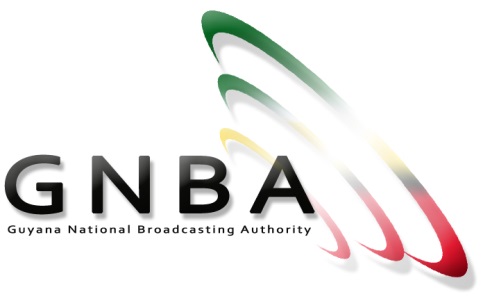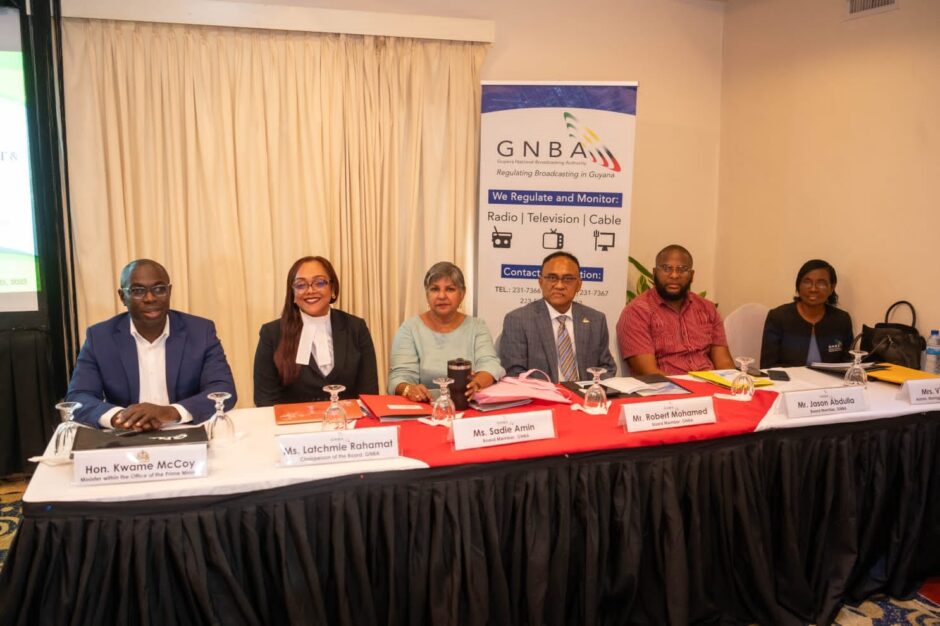Broadcasters warned against misinformation on airwaves …as GNBA flagged 93 infractions in first half of the year
Source: Kaieteur News
The Guyana National Broadcasting Association (GNBA) has recorded a total of 93 breaches made by local broadcasters for the period of January to July 2023. And Minister of Public Affairs, Kwame McCoy said this represent too many infractions on the local radio and television channels.
Addressing a stakeholder meeting at the Herdmanston Hotel in Queenstown Georgetown, McCoy on Wednesday said there are a lot of things that people say on the radio and television that are against the broadcast regulations. McCoy told broadcasters “We have to be very mindful that the space we operate in as broadcasters, belong to the people of Guyana and with that comes a very serious responsibility by making sure whatever we produce or whatever content is on our respective channels are designed and delivered in ways that do not affect our citizenry and do not lead to misinformation and disinformation pushing people to violence or part of hate speeches etc.”
Alluding to an instance where one broadcaster was flagged for referring to Guyana as apartheid state, the minister noted that: “there have been too frequent instances of infractions by broadcasters. They have been flagged but they continue as though there isn’t really any care and consideration for the consequences…” “There are things that I heard myself and those that have been flagged as very serious matters, he said urging stakeholders to be responsible on how they communicate and disseminate the information.

Minister of Public Affairs, Kwame McCoy and other members of the GNBA Board at the stakeholders meeting
In her remarks, chairman of the GNBA, Attorney, Latchmie Rahamat underscored the importance of compliance with broadcasting regulations and the crucial role that broadcasters play in maintaining both local and international broadcasting standards. “In this digital age of rapid advancements in technology and increasingly interconnected global networks, it has become essential for broadcasters to adhere to regulations and uphold these standards to ensure the integrity, accuracy, and accountability of their content,” she said.
Rahamat added that the broadcasting regulations are established by the regulatory bodies to safeguard the interests of the general public and maintain a fair, unbiased, and responsible media environment. She said, “These regulations aim to strike a balance between freedom of speech and protecting individuals and societies from harmful, misleading or offensive content.” According to Rahamat, by complying with these regulations, broadcasters contribute to the creation of an informed, engaged, and well-rounded citizenry.
Furthermore, she said adherence to broadcasting standards and regulations is vital in an increasingly globalised media landscape, which ultimately this is the bigger picture. “By adhering to these standards, broadcasters contribute to the development of a unified global media ecosystem; where ideas can be shared, perspectives can be explored, and understanding and empathy can grow…Your role in this process cannot be understated, undervalued or neglected.”
Additionally, Rahamat said broadcasters should invest in the professional development of their staff, ensuring they are equipped with the necessary skills and knowledge to navigate the complex landscape of regulatory requirements and evolving international broadcasting standards.
To achieve compliance with broadcasting regulations, the GNBA Chairman said it is crucial for broadcasters to establish robust internal policies. “…These policies should encompass guidelines on accuracy, fairness, impartiality, and accountability in reporting, as well as measures to prevent the spread of misinformation and hate speech.” She said too that the collaboration between broadcasters and regulatory bodies such as the GNBA is essential in achieving compliance and maintaining standards.
“Furthermore, broadcasters must leverage technological advancements in content verification and moderation tools to enhance their ability to monitor and control the content they produce and distribute. These advanced tools can help identify potential breaches of regulations, assess the accuracy and objectivity of information, and prevent the dissemination of harmful or offensive content,” Rahamat added.




